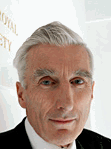 Royal
Society's President, Martin Rees, Calls for Academics to Make Their Voices More
Clearly Heard. (December 1, 2006)
Royal
Society's President, Martin Rees, Calls for Academics to Make Their Voices More
Clearly Heard. (December 1, 2006)|
|
|
|
|
|
|
News & Views item - December 2006 |
![]()
 Royal
Society's President, Martin Rees, Calls for Academics to Make Their Voices More
Clearly Heard. (December 1, 2006)
Royal
Society's President, Martin Rees, Calls for Academics to Make Their Voices More
Clearly Heard. (December 1, 2006)
The Royal Society's president and the UK's Astronomer Royal,
Martin Rees, has outlined his concerns during a ceremony to honour Professor
Stephen Hawking for his contribution to theoretical physics.
Prior to his address he told the BBC's Today programme, "Technology and science
are changing the world in the 21st Century faster than ever, and in
more drastic ways. The main theme of my talk is that science and the world faces
ever more complex issues such as climate change, stem cell research and nuclear
power. How science is applied and prioritised shouldn't be decided just by
scientists. These choices should be made after the widest possible public
discussion by the public, but in the light of the best scientific evidence."
Lord Rees spoke frankly in the Royal Society's 2006 Annual Address, which also saw University of Cambridge's Professor Stephen Hawking being awarded the society's Copley Medal for his contribution to theoretical physics.
In his opinion "mavericks" were grabbing too large a share of media attention in public debates on issues like climate change, stem cell research and nuclear power, and he condemned creationism in British schools, describing the denial of access to education about scientific views of the origins of life as "cultural deprivation".
He also urged his fellow scientists to make greater efforts to explain their work to the public in order to counter the arguments of "extremists", and he warned that we are "ravaging the biosphere", and those that disputed this were given more airtime than they deserved in order to create a media debate. "It used to be controversial whether smoking caused lung cancer or HIV caused Aids, but now there are few mavericks who deny these things. In the case of climate change, it is probably going the same way.
"Scientists should make clear exactly what the benefits are, exactly what is involved in the experiments and they should engage with the public."